How to complete 70 tasks in a day: life in task trackers is a good life
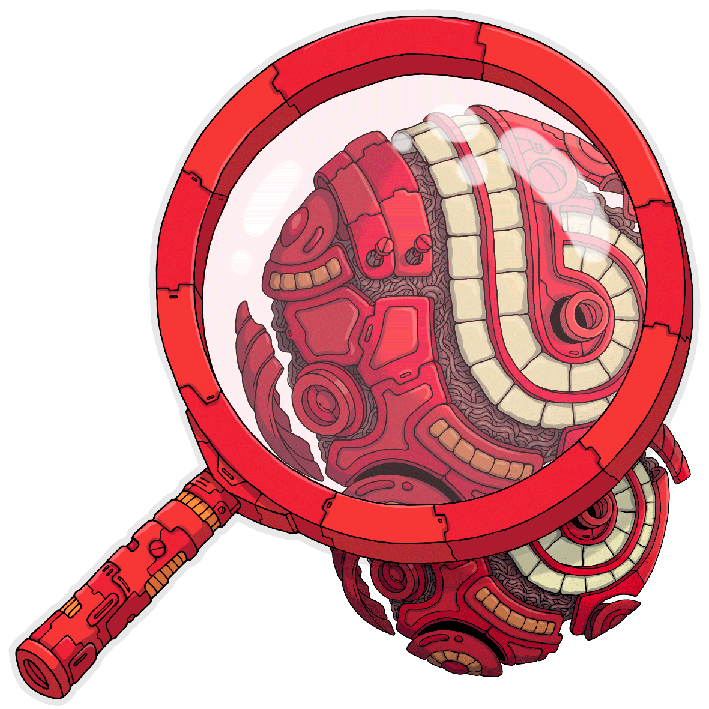
I tried to systematically conduct tasks, probably, about 20-25 times. And each attempt failed, as I understand it, for two reasons.
First, in order to set aside time for task management, you need to understand why this is done.
You start to lead tasks, spend time on it, do less tasks, it all starts to accumulate - in the name of what?
It’s difficult to conduct any work when you don’t understand why. “Streamlining life” is not the most adequate goal, since “streamlining life” is a rather vague phenomenon. But “to reduce the level of anxiety by lowering the level of uncertainty” is a much more concrete and better goal, which can be spent an hour a day on.
Secondly, all the methodologies that I read immediately describe the final state of the process. “You need to take ToDoIst, break it down by project, integrate with the calendar, do weekly task reviews, prioritize them ...” It's hard to start doing right away. As in software development, I believe that you need to use the progressive jpeg method - iteratively.
Therefore, I will go through my “iterations”, and maybe in the same way it will come in handy for you. After all, why is there no reason to use the May holidays to go to work using the new (relatively) paradigm?
And how I came to this can be read here .
Trello, a couple of lists
We create only 4 lists, we use the desktop and mobile application.
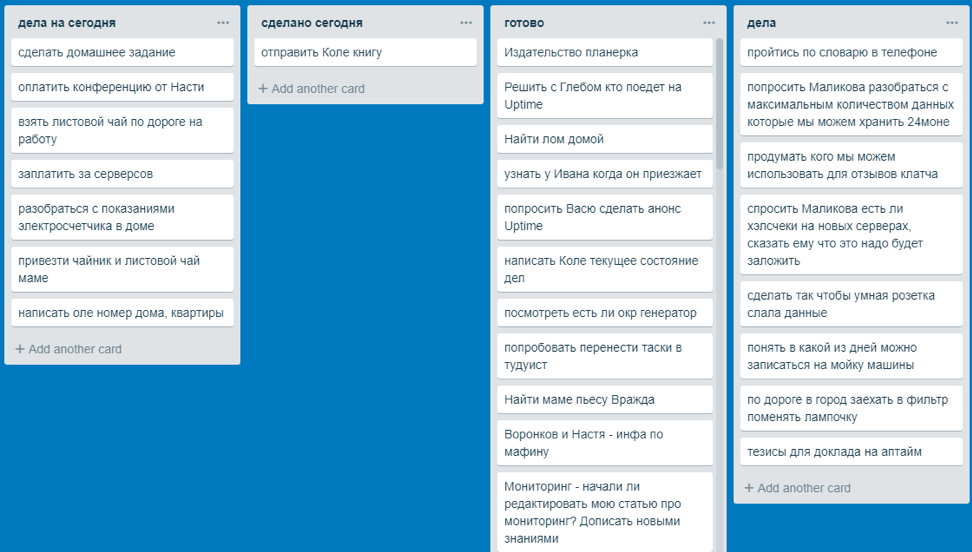
Lists:
- Cases - write down all the tasks that come to mind. And write down as soon as they come to mind. “Throwing out the trash” is a task. “Wash the dishes” is a task. "Assign a planning meeting" is a task. Well, and so on. Even the most obvious and / or important things can be forgotten if something unexpected happened or just had a hard day.
- Cases for today - every evening I transfer affairs from the Cases board to the Cases for Today board. If in the evening some of the affairs will remain there - this is normal, more on that below. Over time, you begin to understand how many tasks can be on the list, so that most of them can be done on the scheduled day.
- Done today. This board is the main way to reduce the anxiety “I haven’t done anything today” and a good way for further reflection on self-organization. I am writing down here all the tasks that I did today, not even from the list of planned ones. “I called Vasya about the documents,” he wrote down. “They asked me to sign the papers,” he wrote down. “We discussed the agreement with Anton,” he wrote down. Thus, by the end of the day you will understand what you really spent time on and what you could not do from these tasks just for the sake of fulfilling the plan.
- Done - a list of all completed tasks. At the beginning or at the end of the day, I move them from "Made Today" to "Finish." In fact, this is such a trash in which you can simply find the completed tasks, and therefore needs regular cleaning.
Trello, the "mini calendar"
At some point, it becomes clear that some tasks are precisely time-bound, and you do not want to forget about them for a week, so as not to plan anything else for this time. It has always been difficult with the calendar, so I added a few boards with the names “Cases for Monday,” “Cases for Tuesday,” etc., in which I began to put things tied to time.
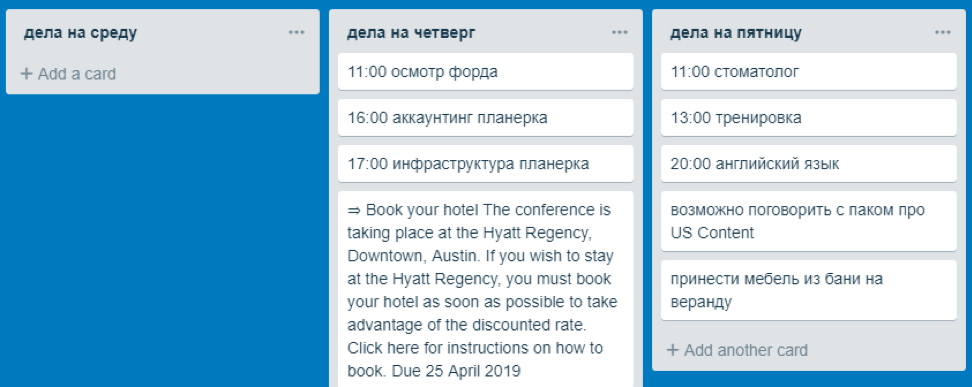
Thus, when they ask me: “Can we talk on Thursday at 16:00?” - I just go to the appropriate board and see what we have written on this time. And we must not forget to transfer tasks between the lists in time during the week: for example, “affairs on Thursday” with the onset of Thursday - in “affairs for today”.
Why not a calendar? For me it is terribly difficult to use two utilities at the same time. If you use a calendar for this - I will need to go into it, fill it out, regularly go into it to check if I have forgotten something ...
At this point I went to the borders of Trello. The main problem was that more than 50 tasks were recorded per day, and there was a contented large pool of cases tied to both the general list and the lists tied to the days. How to understand that I have already written down the task that I need to do? Doubles began to appear. How to prioritize all tasks for one of the projects at the same time? How to give other other people the opportunity to see your calendar plans?
I needed a system that, while maintaining relative ease:
- Could group tasks on projects.
- Have a calendar link (complete tomorrow), and automatically transfer it to tasks for today, with the onset of the day.
- Integrated with Google Calendar.
Here I returned to ToDoist, and at this stage it turned out to be the most suitable solution.
Current thread in ToDoist
Inbox
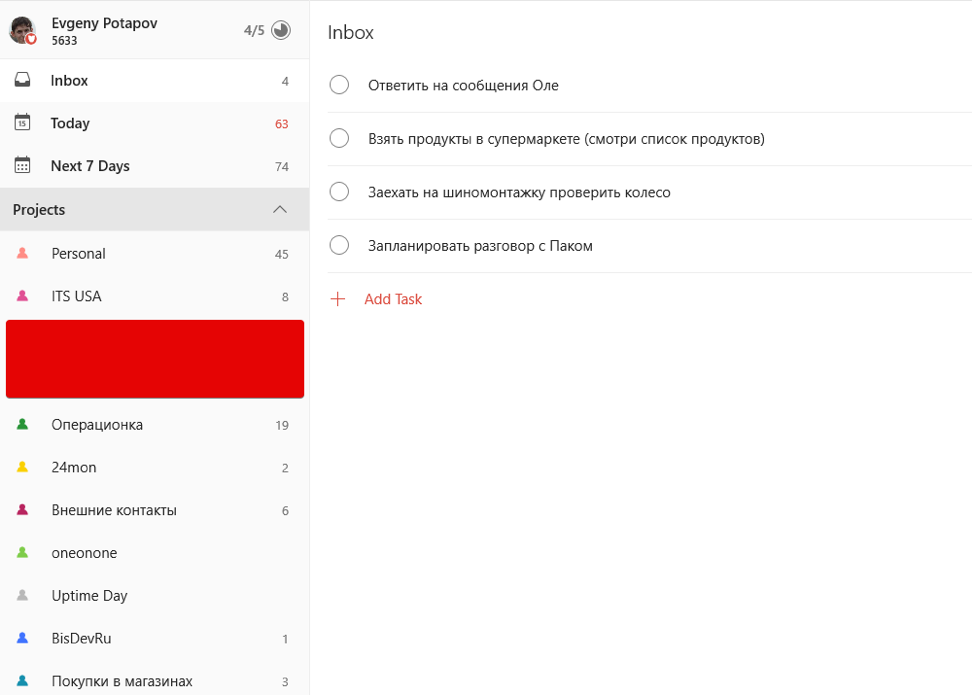
I write any incoming tasks in Inbox, which I try to disassemble immediately. Under parsing is meant:
- Determining the date when the task will be completed (for short tasks, I most often set Today, and by the evening I understand when, in fact, it can be done).
- Definition of the project to which the task can be attributed (for statistics and the ability to somehow change the priority of all tasks for the project).
The tasks that came to mind and which you don’t need to do in the near future go to the Uncategorized Personal (“take cup holders in a car”) and Uncategorized Work (“think about when we can arrange a PR strategy session”) projects. In ToDoist, you can assign repetitive tasks: so every weekend I have the task “Disassemble Uncategorized Personal”, and every Monday - “Disassemble Uncategorized Work”.
Calendar Integration
ToDoist integrates perfectly with Google Calendar, both ways. I have shared a calendar with my colleagues so that they can see when they definitely cannot reach me.

At the same time, tasks from the calendar are also transferred in the opposite direction: I can say, “Serega, look at my time on Friday and write down the meeting there”, which will appear both on the calendar and in ToDoist. So, in fact, I first started using the calendar, and I do not need to create events in it.
Handling non-operational inbound tasks
I do not forcibly rush to do tasks immediately, except for those tasks where a fire is obvious. “We urgently need to contact the management of ABC, because the server is lying, but there is no response from its employees” - obviously a burning task that cannot be postponed, but “Zhenya, can I call you now to talk about one new project” turns into “ Plan when it will be possible to talk with X about Y ”, which will already turn into the task“ Say X that we can talk then ”and the task“ Talk with X about Y ”, which is already time-bound. Almost any incoming task is first transformed into "Plan ...".
Prioritization of tasks
All tasks included in the day cannot be completed. Watching myself, I realized the following (each number will have a different one, but the main thing is to come to conclusions).
- For every day I have about 50-70 tasks recorded.
- Comfortably for myself (without a feeling of total fatigue at the end of the day) I can do up to 30 tasks.
- Having done up to 50 tasks, I will be tired, but uncritically.
- I can close 70 tasks, but after that I can hardly get out of the “stream of workaholism”, I will fall asleep with difficulty and in general will be little social.
Based on this, I decide what to do today. In ToDoist, there is a prioritization of each task, so in the morning I choose critical tasks to perform, and the rest I perform based on capabilities and desires. Every day I transfer about 40-20 tasks to the following: what is interesting - at the same time, 60-70 tasks become again the next day.
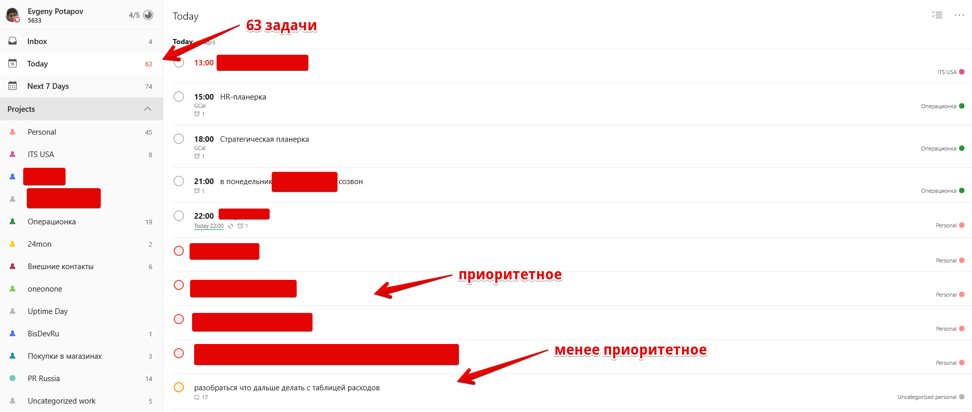
Statistics
I'd like to understand in general, how much time it took today to do business related work, and which ones. To do this, I use the RescueTime application , which is on the phone, on the laptop, and Google Maps Location History (yes, I'm not paranoid).
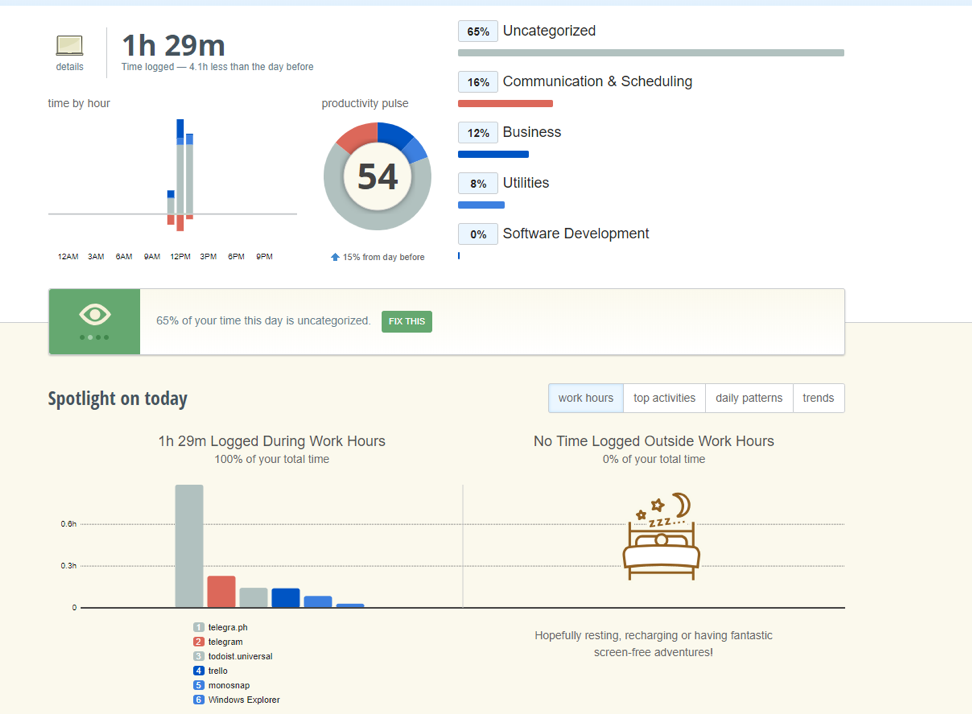
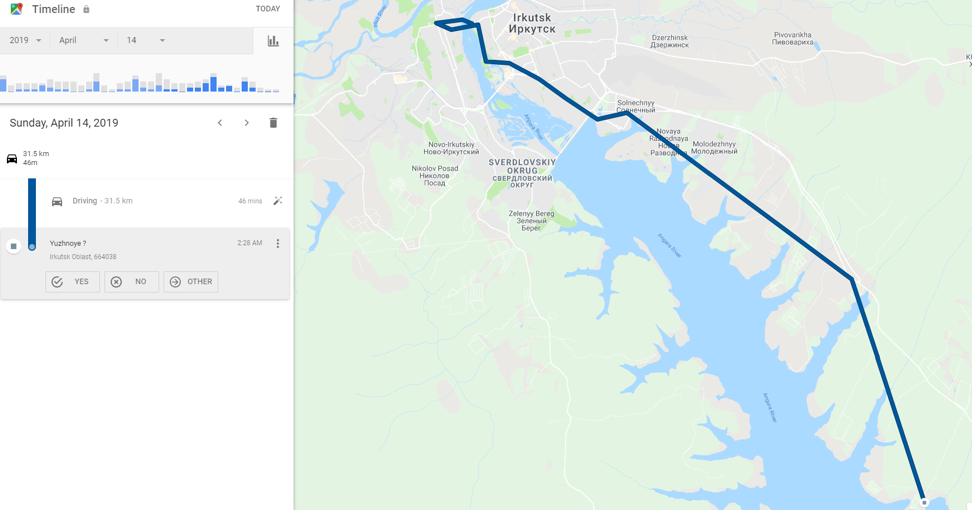
We live outside the city, so the time spent on the road can be used to good use. Now that I'm not tired, I'm listening to audio books along the way in order to somehow use these 40 minutes.
I do not aggregate data yet, creating a peculiar personal Data Lake; the time will come - I will get to this.
There will be no conclusion
- The life of a modern person is a large stream of incoming tasks. It will not be possible to reduce it; one must learn to control this flow.
- Most of the worries come from the uncertainty of the coming. If we understand what awaits us in the coming days, there will be significantly less anxiety.
- For this, you can spend time organizing your day. I know what will happen today, what will happen tomorrow, and I do not forget about the tasks that I had forgotten about before.
- Task tracking is not an end in itself, but, if you like, a way of self-education. Things that used to be done were laziness or things that couldn't be reached by hands, it becomes much easier to do. Many people (and I among them) in general, in general, feel better when tasks are set from the outside world. Task tracking is such a way to set tasks for yourself and learn how to live your desires.
- Work is not an end in itself. The goal is to organize your work schedule in such a way that a predictable free time appears, when you can deal with yourself, families, and your interests.
If you are interested in my ideas and thoughts on it and so on, then you can read the channel :-)
